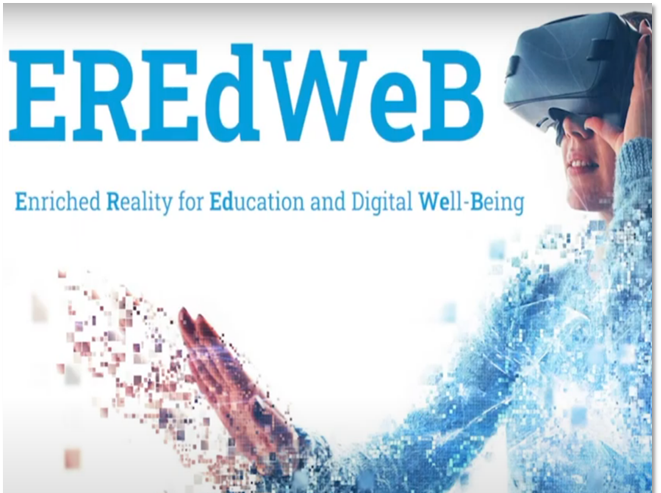EREdWeB - Enriched Reality for Education and Digital Well-Being
The main objective of EREdWeB is to elaborate methods and tools for a better understanding of the relationships between digital well-being and immersive environment (IE) (Virtual Reality, Augmented, Mixed Reality or 360° videos) by providing a set of recommendations for developing educational activities based on IE, addressed at higher education.
Coordinator: University of Florence, ELLIPsy Dpt. – Prof. Maria Ranieri
Partners: University of Birmingham (UK), Linnaeus University (SE), University of Leiden (NL), University of Nantes (FR)

Purpose and Significance
The importance of digital well-being in education, and in particular in higher education, has been growing in recent times, partly due to the increasing demand for technology as a result of the pandemic.
Thus EREdWeB´s main objective is to elaborate a sound methodology, including conceptual models, methods and tools for a better understanding of the relationships between digital well-being and immersive environments as a significant contribution to digital well-being in education. To achieve this purpose, the project aims to provide a set of recommendations for developing educational activities based on IE, mainly targeting higher education.
Implementation Method and Timeline
The project started in June 2020 and ended in May 2021, involving all the partners to evaluate the potential of IE in terms of digital well-being, while considering the related implications they may have in different aspects, as mentioned below:
- Cognitive: since the isolation in these environments can lead to a kind of alienation.
- Physiological: the motion sickness in wearing helmets is one of the most reported drawbacks of using IE.
- Educational: learning opportunities offered by IE as vicarious learning experiences.
- Social: possible disruptive impact on relationships within working groups (e.g. classroom).
Outcomes
The project produced the following main outputs:
- A literature review by selecting relevant works in these fields, with a four-dimensional approach (educational, cognitive, physiological, and social).
- Two learning scenarios designed using immersive environments in higher education, considering well-being aspects.
- A set of recommendations for digital well-being using immersive environments in higher education, also indicating the aspects requiring further studies.
- Networking activities have been carried out, mainly within the EUniWell Consortium, to investigate the future perspective of research and how to take the EREdWeB project forward.
Further information
The EREdWeB Consortium is looking for potential partners to extend the topics analysed in the project and for pursuing further funding opportunities. Further information in the video below:
Contact:
Prof. Maria Ranieri (Florence)
